Hello Steemians!
Today I would like to share with you a little advice that perhaps for many of you is not something of relevance, but that it will be appreciated and valued by a person in HIV positive condition.
 Image source
Image source
Last January 15, it was 9 years since the death of an uncle due to AIDS. On the other hand, I have a great friend who is seropositive and recently immigrated to the United States in search of better quality of life and secure access to antiretroviral treatment. That is why I am sensitive to this topic and I am very informed about this condition. In fact, I say condition because it is NOT considered a disease, unless the individual reaches the AIDS stage. That's why I want to share this post with you, with some advice on how to handle the situation a bit if someone, close friend or family member trusts you by having the virus. It will be relatively extensive, but the subject demands it.
First let's define the basics:
What is HIV?
HIV (an acronym for the human immunodeficiency virus) is a virus that destroys the body's defense system over time. In the past, HIV infection was synonymous with disease and death; the current reality is very different. Even when there is no definitive cure, the life expectancy of the seropositive persons has increased significantly thanks to the development of new treatments that can keep the virus controlled for a long time.
The virus is transmitted from one infected person to another either through sexual contact carried out without taking the respective protection, by transfusions of blood contaminated with the virus, through the exchange of syringes between infected and uninfected persons, and also from a mother infected your child before or during birth or through breast milk. Note that at no time have I used the word "contagion", so it is a very common mistake for someone to say "they spread AIDS to so-and-so" as if it were a flu transmitted by sneezing or simple contact, because it is not the same situation.
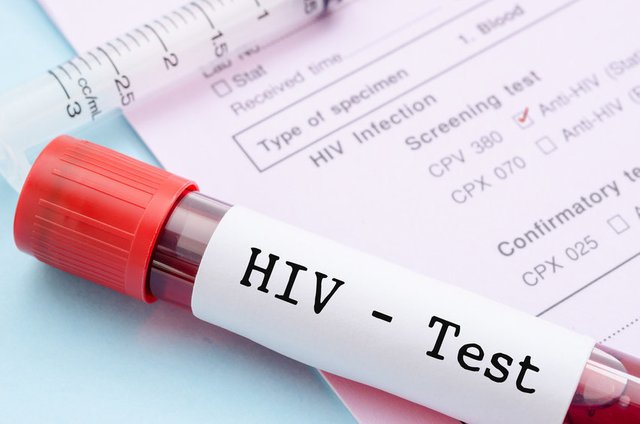 Image source
Image source
Some people may have symptoms similar to seasonal flu and swollen lymph nodes during the initial stage of infection, which disappear until the first manifestations some years later. Other people will present a type of symptomatology not directly associated with this condition, such as headaches, fatigue, night sweats, swollen glands in the neck, armpits, and groin, etc. As the virus progresses, these symptoms will be more frequent.
 Image source
Image source
And then what is AIDS?
The acquired immunodeficiency syndrome (AIDS) is a disease caused by the HIV virus. Whether a person is HIV positive or seropositive does not mean that has AIDS. It can take at least 10 years for an HIV-positive person without any type of treatment to begin to manifest the symptoms of the disease (of course, this will depend on many factors, such as diet, stress level, practice or not exercises or some sport, the intake of multivitamins, the habit of vices such as cigarettes or alcohol, the presence of chronic diseases already acquired; in short, it depends on how careful the immune system is). It is also subject to the amount of viral load present in the body.
The viruses or bacteria that usually cause common infections in people with healthy immune systems, can initiate severe and recurrent infections in those with a weak or immunosuppressed system, and this is where opportunistic infections are mentioned.
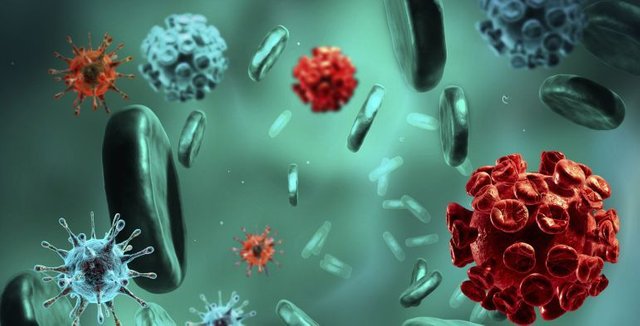
Image source
How do CD4 cells work in the immune system? What is viral load?
The human body is in continuous exposure to attacks of viruses, bacteria, fungi and parasites. The system of defense of the organism recognizes and destroys these invaders for their protection and thus avoid harmful effects. The CD4 or T4 cells coordinate the immune system in the fight against the advance of the virus. When HIV enters the bloodstream, it penetrates the T4 cells and begins to replicate itself, becoming this process in a factory of cells infected with HIV.
A person not infected with HIV will have an average of between 500 and 1500 CD4/mm3 cells in the blood. An infected person, on the other hand, may have them below 200 CD4/mm3, and it is at this point that the risk of opportunistic infections begins.
On the other hand, viral load is the criterion used to measure the amount of HIV in the blood, expressed as copies/mL. The amount of CD4 and viral load are the most important parameters for monitoring the infection in seropositive patients. The values can fluctuate greatly, the highest rates will be observed at the beginning of the infection, before starting therapy and at the end of the AIDS disease. The higher the number of copies/mL, the greater the probability of developing AIDS and / or an increased risk of transmitting HIV.

Graph that outlines how is the progress of HIV/AIDS in the human body.
Image source
How do anti-HIV medicines work?
The goal of antiretroviral therapy is to reduce the amount of viral load as much as possible, to undetectable levels (below 50 copies/mL), allowing the immune system to remain intact or repair if it is partially damaged. For effective treatment, doctors will prescribe a combination of three or more medications, called combination therapy or cocktail, to the patient. This therapy suppresses the replication of the virus, increases life expectancy and considerably reduces the chances of progressing to AIDS, further making the patient "less infectious"; but in no case will it kill the virus or represent a cure.
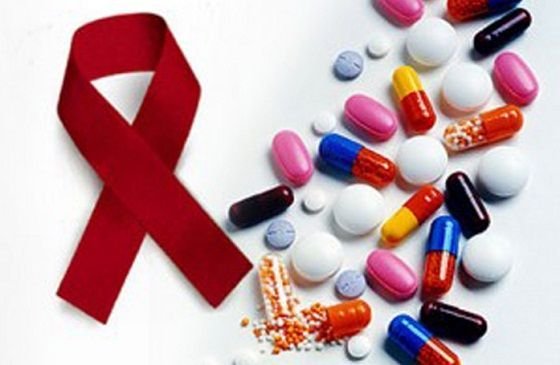
Image source
Initial reaction of a person when find out they have the HIV virus.
Each person will have a different reaction. Some will be immersed in feelings of anger, resentment, fear, shame, disbelief, anxiety or guilt. For example, my uncle, when he found out about it in the late 80's, felt very afraid, for him his life from that moment on would be reduced to being bedridden, skeletal, dying and victim of collective pity. My friend I told you about had panic, but fortunately many people supported him, guided him and also could attend therapies with a psychologist.
Other people will be more determined, that is, they will accept what happened to them, assume their responsibility and seek professional help. Others simply will not be moved by the news and some will seek a fatal outcome. In any case, there are many non-profit organizations with experience in the subject and groups of volunteers willing to guide and help in whatever they can.

Image source
"My first reaction was: This is not possible, I could not believe it, this can not be true, I do not want to live with this, I want to die, I'm going to commit suicide, I'm very confused ... After the diagnosis, I talked to my daughter, since she would realize that something was happening to me, I could not hide it. Fortunately both, she and the rest of my family reacted in the best way, which gave me the strength to face my reality "
Anonymous
"The treatment has helped me to feel the same way I felt before I was diagnosed, my health was very compromised and I felt very bad, but thanks to the medicines my health has recovered"
Anonymous
Who can this be trusted?
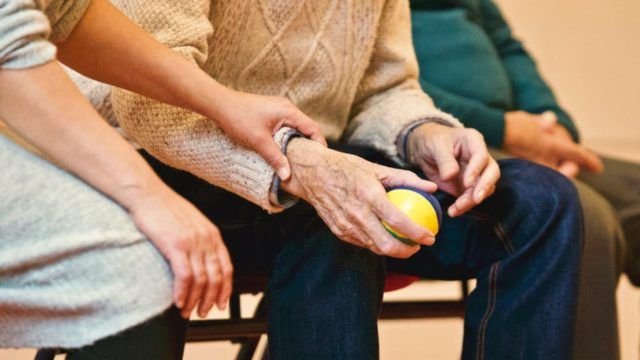
Image source
The decision to tell family, friends and loved ones is very difficult for people living with HIV, since for them it is a diatribe to want their love and support and at the same time fear their rejection. Some people initially confide their situation only to their closest friends, others will feel comfortable talking about their diagnosis in the environment of a support group. Others will gradually increase the circle of people as they feel prepared. So, if a person confides in you, feel grateful because he is telling you something very personal and that merits discretion on the subject that is still a taboo and synonymous with rejection in society.
If someone confides to me that they are HIV positive, what should I do? what do I tell them?
As I have already mentioned, today the life expectancy of a person who has contracted the AIDS virus has increased considerably, in addition, research conducted over time has indicated that a person with that condition can lead a normal life , like you, like me, and unwind in your environment without it representing a danger or threat to the people around you, be it school, work, home, etc.
However, there is still a lot of stigma surrounding the issue and in many countries it is still a taboo. That is why the fear persists on the part of seropositive people to be judged or rejected, which leads to their preferring to keep it a secret. Therefore, with my experience with those two people close to me and investigating, I bring this short, but very useful guide to a notion to know what questions are prudent to ask a friend, family, partner or acquaintance that you get to trust their condition:
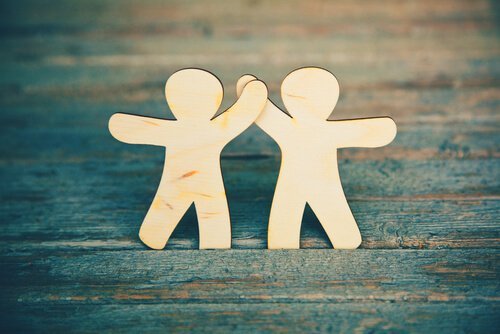
Image source
DO NOT ASK: How did you get contagious?
It is most likely that they have been INFECTED by having unprotected sex, so the question is over. The important thing is that they are being honest about their current situation and it is not necessary to inquire into details. Ask how they feels at that moment. Anyway, if they feel comfortable talking with you, they may tell you something about it by themselves.
YOU CAN ASK: How long have you been dealing with this situation?
In this way, you will be able to realize how long that person has been living with HIV with or without the support of other people. You can also ask who else knows about their state, offer your help to tell more people and thus he/she can live a safe life without stigma, but never press them, let everything be spontaneous.
DO NOT ASK: Have you already taken warning and learned?
HIV is not a punishment and no person, however irresponsible it may be, deserves to contract the virus. You should stop talking about this virus as if it were a consequence of being someone bad, getting what it deserves. This question is exactly the reason why many people are afraid to talk about their situation.
YOU CAN ASK: What are you doing to face it?
This question will give that person the opportunity to think about what this situation has made them feel. It is the perfect opportunity to learn how these people handle the shame and stigma they experience, and it is a way to find out how you can help them in their process.
If that person is in a relationship do not ask if their partner also has the virus.
A serodiscordant relationship is when one of the parts is seropositive and the other is not. To the surprise of many people, in this type of relationship the state of who is HIV positive ceases to be a topic of conversation shortly after discussing it under the relationship, so if it is not important to them, why will it be for you? Surely they must be taking care regardless of the serological status of one with respect to the other, because if a person is open about their condition is because they want to protect those around them. Also, you can put them in the uncomfortable position of discussing someone else's status. Definitely, do not ask this question.
YOU CAN ASK: How do you do to protect yourself from transmitting?
It is perfectly normal for you to worry about the well-being of that person, but you should try to do it in a way that does not sound prejudiced or, worse, that you take for granted that they do not take care of themselves when have sex. You have to deal with them in a carefully way, remember that they are people who are probably still affected in a psychological way or they cost a bit to take their situation with dignity and face up. You must ask the question with respect.
DEFINITELY, DO NOT ASK: Are you going to get AIDS? / What you got is AIDS? / When are you going to die?
It is very likely today that person never develops AIDS, which is a term to name the most advanced stages of the virus. The term "AIDS" developed when HIV medications were not as effective as they are now. Also remember that term sounds very strong, for all that implies. Rather, tell that person that they have your support, because at present VIH virus it is not a death sentence, and there are no differences between you and they, so they can lead a normal life. Finally, you can thank them for have trusted you.
 Image source
Image source
The world has to stop being so discriminatory. People discriminate by height, by the social stratum, by the number of followers in social networks, if you are stuttering, if you are crippled, if you are nerd, if you are from the North or South and a long etcetera. A person with VIH positive condition must have many concerns so that also their friends and close people are bothering them. Be understanding, remember that life goes around; today is that person in this situation, tomorrow could be you, because nobody is exempt, remember that HIV virus does not discriminate by race, sex, religion, social position, political tendency or place of residence. You just protect yourself from it.
Tips to protect yourself from HIV:

Image source
Have a stable sexual partner. Do not be promiscuous. Remember that when you have sex with someone, you are having sex with all it sexual past. Not only is about putting the condom and that is enough. Not.
Use a condom. That will decrease the chances of infection. But use it correctly, remember that it will also protect you from others sexually transmitted infections.
Make sure that your mouth does not come in contact with semen, pre-seminal fluid or lubrication, vaginal or menstrual fluids when you are practicing oral sex. Remember that if a person has the virus and does not know it, it is likely to have a high viral load, which increases the risk of transmission.
The kisses and caresses do not represent any risk. The amount of virus that can be in the saliva, sweat and tears is so low that it does not represent a risk of infection.
I leave you with a short video about HIV discrimination, courtesy of RYOT:











It is always good to read about it, many make erroneous comments and think things that are wrong. Very well educated about this condition, which is not more than that. Thanks for sharing.
Thanks to you for reading and commenting it!